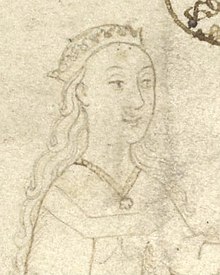Anne Beauchamp, 15th Countess of Warwick
Anne Beauchamp | |
|---|---|
 Drawing of Anne from the Rous Roll, c. 1483 | |
| Born | 14 February 1444 Cardiff, Glamorgan, Wales |
| Died | 3 June 1449 (aged 5) Ewelme, Oxfordshire, England |
| Resting place | Reading Abbey, Berkshire 51°27′22.85″N 0°57′54.31″W / 51.4563472°N 0.9650861°W |
| Title | 15th Countess of Warwick 7th Baroness Burghersh |
| Term | 11 June 1446 – 3 June 1449 |
| Successor | Richard Neville |
| Parents |
|
Anne Beauchamp, 15th Countess of Warwick (14 February 1444 – 3 June 1449), was the only child and heiress of the English nobleman Henry Beauchamp, 1st Duke of Warwick. She died a child aged 5, after which the earldom of Warwick was inherited by her paternal aunt. The title then passed by marriage to Anne's maternal uncle, Richard Neville, the famous 'Kingmaker' of the later Wars of the Roses.
Life
Anne Beauchamp was born on 14 February 1444[1] at Cardiff in Wales.[2] Her father was Henry Beauchamp, Duke of Warwick (1425–1446), the last male of the medieval Beauchamp family to hold the Warwick title. Anne's mother was Cecily Neville, sister to Richard Neville, who later played a key role in the Wars of the Roses.
On 11 June 1446, Anne's father died.[2] The dukedom of Warwick, created in 1445, had been originally granted only to male heirs,[3] and so became extinct upon Henry Beauchamp's death, but the earldom (created in 1088) allowed for female succession and was therefore inherited by his daughter. She also inherited from her father the barony of Burghersh, being the 7th person to hold that title since its creation in 1330. Upon the death of King Henry VI's uncle Humphrey, Duke of Gloucester, on 23 February 1447, Anne also succeeded to the lordship of the Channel Islands, which had been previously entailed on her father.[2]
The infant Anne was one of the greatest heiresses of her day, alongside the infant Lady Margaret Beaufort, the daughter of the 1st Duke of Somerset who had died in 1444. Both girls became wards of Anne's maternal step-great-grandmother, Alice Chaucer (widow of Thomas Montagu, 4th Earl of Salisbury, and a lady-in-waiting to Queen Margaret of Anjou) and William de la Pole, shortly to be Duke of Suffolk, who intended Anne to marry his own heir,[4] John de la Pole (1442–1492).
Anne died on 3 June 1449,[5] aged five, at Ewelme (the Chaucer home[6]) in Oxfordshire.[2] She was buried in Reading Abbey church. Reading may have been chosen as her burial site because her great grandmother, Constance of York, had been buried there.[7]
Anne's title Countess of Warwick was inherited by her paternal aunt, Lady Anne. The barony of Burghersh fell into abeyance between her aunts.[8]
After Anne's death, the Duke of Suffolk instead arranged a 'solemn betrothal' between his son and Lady Margaret, a marriage contract that by law could be, and on the initiative of the king was, dissolved while the bride was below the age of twelve; Margaret herself never subsequently recognized John as her first husband.[9] John went on to marry Elizabeth of York, sister to the later kings Edward IV and Richard III. Margaret married Edmund Tudor, 1st Earl of Richmond, and became the mother of King Henry VII.
Ancestry
Footnotes
- ^ Hicks 1998, p. 31.
- ^ a b c d Cokayne 1959, p. 384.
- ^ a b Cokayne 1959, p. 383.
- ^ Hicks 1998, p. 32.
- ^ Hicks 1998, pp. 30–32.
- ^ Watts, John. "Pole, William de la, first duke of Suffolk", Oxford Dictionary of National Biography, 23 September 2004. Accessed 2 February 2019.
- ^ Baxter 2016, p. 83.
- ^ Cokayne 1959, p. 385.
- ^ Jones, Michael K. and Underwood, Malcolm G. "Beaufort, Margaret [known as Lady Margaret Beaufort], countess of Richmond and Derby", Oxford Dictionary of National Biography, 23 September 2004. Accessed 3 February 2019.
- ^ Cokayne 1959, p. 382.
- ^ a b c d Richardson III 2011, pp. 161–162.
- ^ Cokayne 1959, p. 378.
- ^ a b c Cokayne 1959, p. 377.
- ^ a b c d Richardson II 2011, pp. 76–77.
- ^ a b c d Richardson III 2011, pp. 159–160.
- ^ Cokayne 1959, p. 375.
- ^ Cokayne 1959, p. 374.
- ^ a b Richardson II 2011, p. 75.
- ^ a b Richardson III 2011, p. 244.
- ^ a b Richardson III 2011, pp. 246–247.
- ^ a b Richardson III 2011, p. 158.
References
- Baxter, Ron (2016). The Royal Abbey of Reading. Boydell Press. ISBN 978-1-78327-084-2.
- Cokayne, G.E. (1959). G.H. White (ed.). The Complete Peerage. Vol. 12 (2nd ed.). London: The St. Catherine Press.
- Hicks, M.A. (1998). Warwick the Kingmaker. Oxford: Blackwell Publishers. ISBN 978-0-631-16259-9.
- Richardson, D. (2011). Kimball G. Everingham (ed.). Magna Carta Ancestry. Vol. II (2nd ed.). Salt Lake City. ISBN 978-1-4499-6638-6.
{{cite book}}: CS1 maint: location missing publisher (link) - Richardson, D. (2011). Kimball G. Everingham (ed.). Magna Carta Ancestry. Vol. III (2nd ed.). Salt Lake City. ISBN 978-1-4499-6639-3.
{{cite book}}: CS1 maint: location missing publisher (link)
- 1444 births
- 1449 deaths
- 15th-century English nobility
- 15th-century English women
- Beauchamp family
- Burials at Reading Abbey
- Earls of Warwick (1088 creation)
- English countesses
- Daughters of English dukes
- Hereditary women peers
- People from Cardiff
- People from South Oxfordshire District
- Barons Burghersh
- Royalty and nobility who died as children
